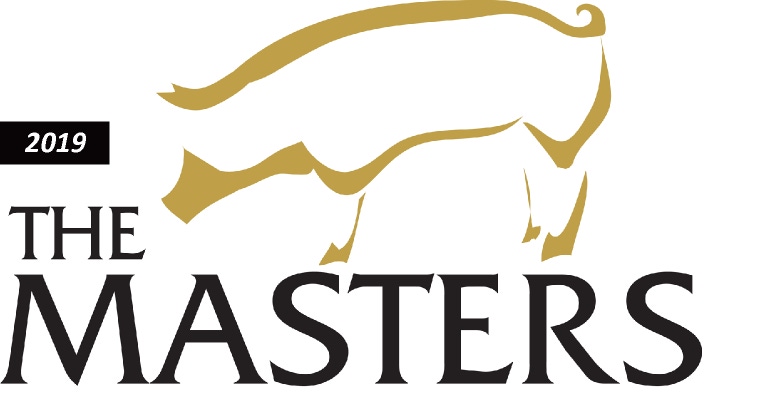Masters of the Pork Industry share qualities with golfers at the top of their games. These Masters help feed the world, rather than playing a game.

It seems like the world stops one weekend every April as 90 to 100 of the top golfers take to Augusta National Golf Club in the city of Augusta, Ga., as the best golfers vie for millions in prize money and a prestigious green jacket.
I have tried my hand at golfing, with little success or fanfare. My achievements on the links may be part of the reason that I do not find the lure of watching golf on TV. To me, golf is a nice way to spend a day with the buddies while walking (or driving) a beautifully manicured yard that just happens to have 18 holes. But to spend an April weekend watching other people walk a beautifully manicured yard? Well, I can think of a lot of better things to do.
Every year, about a month after the golf world focuses its eyes on The Masters tournament, National Hog Farmer focuses in on a set of different Masters — the Masters of the Pork Industry.
Hopefully by now you have met the 2019 class of Masters: Wakefield Pork Inc., Scott Dee, Hog Slat Inc., Steve Quick and John Patience, either through their stories online, in the magazine or in the online slideshow.
Unlike that annual golf tournament, there are numerous National Hog Farmer’s Masters named each year to represent producers, veterinarians, academia and allied industry. This year’s class doubled up on producers with the Langhorst Family behind Wakefield Pork Inc. and Steve Quick with The Maschhoffs.
The winner of the Masters golf tournament has to play great golf over a four-day period. Masters of the Pork Industry have to be on the top of their game day-in, day-out, 365 days a year, and for years upon years. There are no days off in U.S. swine production.
Golf courses have sand traps and water hazards, but the participants know what they’re up against on the course. Some hazards Pork Masters face are visible, while far too many others can pop up with little or no warning. Everything is going along swimmingly, and then bam! Strep suis hits the herd.
Many external forces working against Pork Masters are brought on by others: can you say retaliatory tariffs?
Regardless the hazards that exist or crop up, this year’s class of the Masters of the Pork Industry continue with their passion. Though professional golfers have chances to make a lot of money playing a game, Pork Masters work in a noble profession to help feed the world.
This year’s chosen Masters do share some similarities with those who vie for the green jacket in Augusta.
Go with your strengths: Every golfer has a strong part of their game, and they seek help from others to improve where their game lacks. Steve, Mary and Lincoln Langhorst of Wakefield Pork Inc. know that the caretakers in the system’s barns are good at caring for pigs. The company’s core competency will continue to be top pig care, while aligning the company with feed mills and trucking companies that are very good at what they do.
Don’t stop challenging yourself: A complacent golfer will never reach their full potential if they settle with a talent plateau. At various times throughout veterinarian Scott Dee’s career he has found himself with an itch, an itch that needed to be scratched. That itch to discover answers to some of the swine industry’s intriguing questions has led to many hog facilities now being filtered to reduce viral loads from airborne pathogens, and now looking at mitigation of virus risk in assorted feedstuffs.
Prove naysayers wrong: A lot of pro athletes, golfers included, have been told somewhere along the line that they can’t do something, that they’ll never make it. But they have the drive to prove people wrong. Billy Herring went against the trend when Hog Slat Inc. announced they were going to start manufacturing gang slats, rather than the single slats common in the industry in the early 1970s. The Herring family has done quite well for themselves from building gang slats and a number of other products for hog production, as well as producing hogs.
No quitting: If you want to be at the top of your game, you more than likely will have to put in extra practice. Same goes for pork production. If you want to have a top producing, healthy herd, you will have to put in the extra work to make sure the herd is cared for. Steve Quick with The Maschhoffs has been called “stockman,” knowing a time clock doesn’t indicate when it’s quitting time. When the work is done is when it’s time to call it a day, or a night as often is the case.
A little luck helps: Even when a golfer is at the top of his or her game, they won’t refuse the helps of a little luck. Iowa State University’s John Patience admits that he has benefited from luck many times in his career as a renowned swine nutritionist.
Masters champion are simply humans who happen to be very good at playing a game, and who don’t get frustrated chasing around a little white ball. Masters of the Pork Industry are also merely humans, but we are fortunate that they have become very good at what they do whether it’s caring for pigs, searching for answers to health issues, building better hog equipment or finding the secret to a better diet.
Our Masters don’t wear green jackets; they wear the swine industry on their sleeves.
About the Author(s)
You May Also Like



